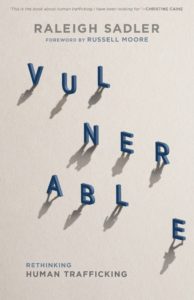Raleigh Sadler speaks and writes on the topics of vulnerability and human trafficking. He has been published at The Gospel Coalition, The Huffington Post, and The Ethics and Religious Liberty Commission, among others. In 2013, he began a movement called Let My People Go, which grew into a nonprofit organization that comes alongside and empowers local churches to address the injustice of human trafficking in a holistic manner.
Raleigh’s latest book is Vulnerable: Rethinking Human Trafficking. Raleigh makes the case that anyone can fight human trafficking by focusing on those who are most often targeted. This book invites the reader to understand their role in the problem of human trafficking, but more importantly, their role in the solution.
We had a chance to talk with Raleigh about his new book and how we can engage in the fight against human trafficking…
What prompted you to write this book?
It’s easy to get overwhelmed when we hear about the problem of human trafficking. I wrote this book to help everyday people realize that they can do something right now to fight human trafficking.
Why is it so crucial that we start this journey with the word “vulnerable”? How does that change our perspective and understanding of the problem of human trafficking?
Upon hearing about the enormity of the problem, our first inclination is to go into hero mode. Taking the mantle of a “Christian vigilante” we begin to think about ways that we can rescue people from the clutches of traffickers. But this is neither a realistic nor helpful assumption. To put it simply, we don’t need to be superheroes to fight human trafficking; we need to be neighbors. Traffickers prey on vulnerable populations. When we approach those most vulnerable around us as fellow sufferers, we will find ourselves face to face with modern day slavery. It’s through our perceived weaknesses that we are best positioned to fight human trafficking.
Can you define what you mean by the term “human trafficking”?
Simply put, human trafficking is the exploitation of vulnerability for commercial gain.
What has shocked you the most about leading this endeavor to end human trafficking?
The most shocking realization that I have come to understand is that anyone can address human trafficking. But it’s not in the way that we would expect. It’s not through our strength that we can best meet the needs of those around us. It’s through our shared vulnerability. It’s a bridge of  sorts linking us to those in our community with whom we may struggle to find commonalities.
sorts linking us to those in our community with whom we may struggle to find commonalities.
How have some of our attempts to stop human trafficking ignored the imperative of being vulnerable? How can these attempts do more harm than good?
We seem to prefer “quick fixes” to long-term developmental approaches. The problem with a rescue model…. is [that it is] often more transactional than it is relational. It assumes often that the main problem facing someone is their immediate situation. However, a model acknowledging vulnerability sees the needs impacting each person as more holistic.
The danger with a paternalistic rescue motif is that it centers the role of the hero on the “rescuer” and not the survivor. As we do this, we find ourselves in a position of power over the vulnerable person in our care. Without knowing it, we can exploit this person.
What are some myths about human trafficking and how to fight it?
Five myths are dealt with in detail in the book. In addition, here are a few more:
- The Highway myth: It only happens near highways
- The “Movement” myth: This assumes that the term “trafficking” actually implies movement
- The Superbowl Myth: That it only happens around large sporting events
Why do you think the church needs the message of this book right now?
This is a season in the life of the church, and the world at large, where vulnerability is heightened. People are aware of vulnerability like never before. We have unprecedented access to the brokenness impacting image bearers around the world. I’d venture to guess that we all feel more overwhelmed than ever. This book exists that our answer lies right behind our feeling of inadequacy.
How is this book different from others on human trafficking?
This book calls people to address human trafficking through the lens of vulnerability, sing the Gospel as their motivation. Most books attempt to motivate the reader through a strategic use of law. Often when the law (“do this and live”) is used as a motivator, guilt ensues. But when grace is used, we are reminded that we are free to love our neighbor. The book addresses that fact that because of Christ, we don’t have to perfectly love our neighbor to be loved. We are loved, so now it goes from being an obligation to an opportunity.
The book is divided into six sections:
- When Vulnerability Is Exploited.
- Recognizing Vulnerability in Scripture.
- Recognizing the Vulnerability around Us.
- Recognizing Your Own Vulnerability.
- Recognizing Your Vulnerable Mission.
- Responding to the Vulnerability of Others.
My hope is that readers will become better equipped to see the problem, to see their your part in the problem, and to see how they can be part of the solution. I hope that when readers finish this book, they will begin to see their most vulnerable neighbors. Really see them. Start a conversation. As they pull that thread, they will discover where they are led.
You Might Also Like
Lifeway lleva a cabo exitoso lanzamiento internacional de la EBV en Ciudad de México
Reflexión: Ausencia divina
Lifeway llevó a cabo la conferencia Transformados a Su imagen en Monterrey, México
La Importancia de Utilizar la Biblia Adecuada para un Estudio Detallado
Lifeway / B&H Español presente en Fieles a Su Llamado 2023
